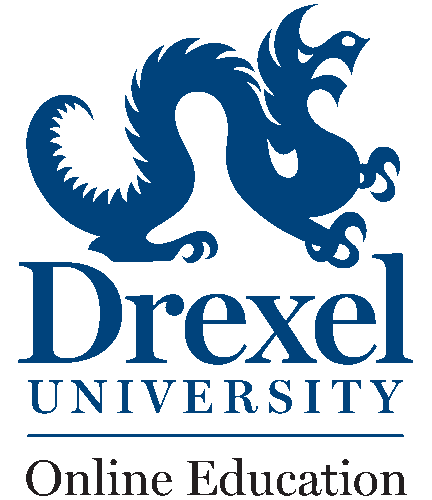


Requirements
and Restrictions
Learning Work?
or Live Event
MS in Education Improvement and Transformation
Classes Begin: March 30, 20262 years
Fully Online
45
Build your degree based on educational interests & needs
A Customizable Degree for Educational Professionals
Drexel University’s online Master’s in Education Improvement and Transformation (EIT) degree is a customizable, largely self-designed program that gives you flexibility to select which areas of education you wish to study in order to meet your individual career goals. The degree is designed to help you grow and advance in a wide variety of educational settings, including, but not limited to, PK-12 schools, post-secondary education, government, and non-profit organizations. The EIT program is potentially valuable for individuals at different stages of their career, whether just entering the education field or mid-career professionals seeking a degree and/or increased knowledge and skills. Previous experience in the education field is not required. The EIT program is offered entirely online allowing for flexibility through distance learning.
Pathway to Graduation for an MS in Ed Improvement & Transformation Student
Upon enrollment, you can select three areas of study from multiple professional development concentrations and post-bachelor’s certificate options, while also taking electives from within the School of Education or other schools at Drexel and completing a three-course, research-based capstone project.
There are two pathways to completing the MS in Education Improvement and Transformation degree:
Option 1: Enroll in the program directly
You can apply directly to the online Education Improvement and Transformation MS program. Once accepted into the program, you will pursue three areas of study of your choice. This can be completed by choosing three professional development concentrations, three post-bachelor's certificates (PBCs), or a combination of both - from among 5 possible PBCs and 12 concentrations.
Option 2: Enroll in stackable certificate programs
You can start by taking one of the certificate programs below and then “stacking” multiple certificate programs together. With this option, you will need to apply to the online MS in Education Improvement and Transformation program no later than by the time of completion of the second certificate program. This option is ideal for those who have already taken one of the certificates below, or those who are not interested in a full master’s degree program at this time.
MS in Education Improvement and Transformation Online Program Features
- Program curriculum is designed to allow for customization that aligns with your career goals and interests
- A flexible distance-learning program that fits well into your busy work and personal schedule
- Ideal for those with or without a previous background in the education field
- Completion of a three-course capstone research sequence personally meaningful to you
- 45-credit program can be completed in two years
- Work closely with academic advisors who help you create a plan of study that complements your career objectives and can counsel you in managing coursework, meeting program requirements and ensuring completion of the program
Professional Development Concentration Options
If you choose to enroll in this online master’s program directly, you’ll customize your curriculum by selecting three professional development concentrations and/or post-bachelor’s certificates. The professional development concentrations will provide you with the knowledge and skills needed to expand your expertise in these specific areas of education. MS in Education Improvement and Transformation concentrations include:
- Creativity & Innovation
Learn how to think like a creative professional, apply creativity to your chosen career, tap into your innate creativity, and investigate strategies to implement your ideas in an educational setting. - Education Policy
Gain insight into the policy-making aspect of education, with an emphasis on American policy and the ethics behind creating educational policies. - Entrepreneurship
Learn tools used by successful entrepreneurs and apply your knowledge through social experiential learning experiences. - Evaluation & Assessment
Even the most successful education institutions need to evaluate their performance. This concentration focuses on the evaluation process and how to effectively assess institutions on multiple levels. - Higher Education Leadership
Develop the skills and knowledge necessary to begin or advance your career in administration and leadership within the broad field of higher education. - Instructional Design for e-Learning
Prepare to effectively and efficiently design learning environments in diverse organizational settings using a variety of media. - Leadership in Educational Settings
Gain the knowledge and skills needed to be a leader in an educational setting, and examine how educational leaders operate by exploring topics such as decision-making and policy. - Learning Analytics
Prepare to make data-driven decisions about education improvement using a broad range of data collection, analytical, and visualization methods. - Mind, Brain, and Learning
Study mind, brain, and education science in real-world contexts and apply this knowledge through innovative teaching, assessment, and instructional design in alignment with the human learning process. - Organization and Talent Development
Gain the capabilities and competencies to lead talent development, coaching and mentoring, and organization development and change initiatives in any organizational setting. - Special Education Law & Process
Prepare to meet the unique learning needs of students with disabilities, through legally mandated school, home, and community collaboration. - Urban Education
Learn about the differences and similarities between urban and rural education settings, and how to resolve conflict in urban school settings, among other relevant topics.
Post-Bachelor’s Certificate Options
Like the professional development concentrations, the post-bachelor’s certificate options will help you grow your expertise in specific areas of education. If you complete one of the options below, you will be awarded with a certificate. This means that upon graduation from the Education Improvement and Transformation program, you will have had the opportunity to earn your master’s degree as well as up to three certificates. Post-bachelor’s certificate options include:
- Creativity Tools and Techniques for the Classroom and Workplace
Learn hands-on creative problem-solving techniques that can immediately be used to bring innovation into your work environment. - Instructional Design for e-Learning
Apply the tools and techniques of instructional design to learning environments from PreK-12 education, higher education, workplace training, and more. - Learning Analytics
Gain the skills to make data-driven decisions to improve and lead change in educational systems. - Organizational and Talent Development
Gain foundational knowledge in talent development, coaching and mentoring, and organization development to help facilitate change in your workplace. - U.S. Education Policy
Develop an understanding of the U.S. education system, policy, and important issues within education to advance your knowledge as an educator.
Online MS in Ed Improvement & Transformation Program FAQs
Can the Education Improvement and Transformation program be completed 100% online?
This is a completely online program with no on-campus requirements.
Why should I earn an MS in Education Improvement and Transformation?
Drexel’s online MS in Education Improvement and Transformation is designed to help you advance your particular career goals And, with multiple pathways to graduation, you can complete this degree in the way that is most convenient and relevant for you.
What does the 3-course Capstone Sequence involve?
Students in the MS in Education Improvement and Transformation program complete a research capstone course where they are introduced to various types of research designs and learn to be both consumers and producers of research. Following completion of the research course, students will complete a two-course multi-disciplinary capstone experience.
Alumni Spotlight
Discover how the diverse educational topics covered in MS in Education Improvement and Transformation program provided Ashely Trump with the flexibility to apply her knowledge across various areas of international higher education, ultimately positioning her for a new role in international admissions.
Archived Webinars
- MS in Education Improvement and Transformation Information Session
- MS in Education Improvement and Transformation Student Experience
Related Educational Degree & Certificate Programs
Drexel University offers multiple online programs that help you bring innovation into the educational space. Whether you’re looking for a master’s degree or a certificate, these programs will prepare you with the skills you need to create a culture of innovation in your classroom, school, and beyond.
Drexel University offers a variety of Graduate Minors that can be added to any master's degree program.
State restrictions may apply to some programs.
Curriculum
This program is organized into four 10-week quarters per year (as opposed to the traditional two semester system) which means you can take more courses in a shorter time period. One semester credit is equivalent to 1.5 quarter credits.
| Select three professional development concentrations from the list below: | 27.0 | |
| Creativity & Innovation (PDCR) | ||
|
CRTV 502
|
Tools and Techniques in Creativity | |
|
CRTV 503
|
Creativity in the Workplace | |
|
CRTV 650
|
Current Trends in Creativity & Innovation | |
| Educational Policy (PDEP) | ||
|
EDPO 622
|
Foundations of Education Policy | |
|
EDPO 628
|
American Educational Policy and U.S. Competitiveness | |
|
or EDGI 604
|
Quantitative Literacy: Interpreting and reporting data for educational policy and research | |
|
EDPO 632
|
Ethics in Educational Policy Making | |
| Entrepreneurship (PDET) | ||
|
Select three of the following:
|
||
|
ENTP 501
|
Entrepreneurship Practice & Mindset | |
|
ENTP 535
|
Social Entrepreneurship | |
|
ENTP 575
|
Entrepreneurship in Education | |
|
ENTP 611
|
Learning from Failure | |
| Evaluation & Assessment (PDEA) | ||
|
EDAM 722
|
Evaluation & Assessment Competencies | |
|
or EDHE 541
|
Institutional Assessment, Accreditation and Effectiveness | |
|
EDCR 518
|
Evidence-Based Evaluation | |
|
EDGI 604
|
Quantitative Literacy: Interpreting and reporting data for educational policy and research | |
| Higher Education Leadership (PDHE) | ||
|
EDHE 501
|
Foundations of Higher Education and Governance | |
|
EDHE 531
|
Legal Issues & Ethics in Higher Education | |
|
EDHE 541
|
Institutional Assessment, Accreditation and Effectiveness | |
|
or CRTV 604
|
Neurodiversity in Education and Workforce | |
| Instructional Design for eLearning (CIDL) | ||
|
EDLT 551
|
Instructional Design Methods | |
|
EDLT 552
|
Instructional Design: Project Management | |
|
ELL 503
|
Teaching and Learning Issues in E-Learning | |
| Leadership in Educational Settings (PDLD) | ||
|
CRTV 610
|
Creativity and Change Leadership | |
|
EDAM 712
|
School and Community Partnerships and Relations | |
|
EDCR 510
|
Leadership in Educational Contexts and Systems | |
|
or EDAM 724
|
Mentoring and Collaborative Leadership | |
| Learning Analytics (PDLA) | ||
|
EDLT 591
|
Learning Analytics: Lenses on students, teaching, and curriculum enactment | |
|
EDLT 592
|
Information Enabled Change in Educational Organizations | |
|
EDLT 593
|
Using Data to Understand Educational Systems | |
| Mind, Brain, and Learning (PDMB) | ||
|
CRTV 600
|
Mind, Brain and Learning | |
|
CRTV 604
|
Neurodiversity in Education and Workforce | |
|
CRTV 608
|
Neuropedagogy and Assessment | |
| Organization and Talent Development (PDHR) | ||
|
EHRD 500
|
Foundations of Human Resources Development | |
|
EHRD 602
|
Coaching and Mentoring for Sustainable Learning | |
|
EHRD 611
|
Organization Development and Change | |
| Special Education Law and Process (CELP) | ||
|
Required:
|
||
|
EDEX 601
|
Special Education Advocacy | |
|
EDEX 710
|
School Law & Policy in Special Education | |
|
Select one of the following:
|
||
|
EDEX 600
|
Family, School and Community Engagement in Special Education | |
|
EDEX 602
|
Special Education Dispute Resolution and Skills Training | |
| Urban Education (PDUE) | ||
|
EDAM 700
|
Leading in Urban, Rural and Suburban Settings | |
|
EDCR 514
|
Diversity, Equity, and Social Justice in Education | |
|
or EDUC 516
|
Diversity and Today's Teacher | |
|
EDGI 550
|
Educating for Peace, Social Justice, and Human Rights | |
|
or EDAM 701
|
Resource Management, Allocation and Entrepreneurship | |
| Electives | 9.0 | |
|
Students select 9 credits of School of Education electives with advisor assistance *
|
||
| Capstone Courses | 9.0-10.5 | |
|
EDU 780
|
Capstone Research | |
|
EDU 781
|
Masters Capstone I | |
|
EDU 782
|
Masters Capstone II | |
|
or EDUP 781
|
Practitioner Capstone Course II | |
| Total Credits | 45.0-46.5 | |
- *Electives include graduate courses in the School of Education with course numbers 500-799 and, under certain circumstances, graduate courses offered by other Drexel colleges and schools.
Students have the option to select from the Practitioner or Thesis Capstone track during Second Year, Spring and Summer Terms.
Note: Second Year Summer may be less than the 4.5-credit minimum required (considered half-time status) of graduate programs to be considered financial aid eligible. As a result, aid would not be disbursed to students this term.
Admissions Criteria
- A bachelor's degree from a regionally accredited institution
- Undergraduate GPA of 3.0 or higher
- Graduate degree GPAs will be considered along with the undergraduate GPA
Required Documents
With multiple ways to submit documents, Drexel makes it easy to complete your application. Learn more by visiting our Completing Your Application Guide.
- A completed application
- Official transcripts from all universities or colleges and other post-secondary educational institutions (including trade schools) attended
- Two professional letters of recommendation
- Resume
- Personal Statement (500 - 750 words) describing your interest in the program. Specifically:
- How the program relates to your previous educational and professional activities
- If changing course, why you’re moving in this new direction with your educational goals
- How the program relates to your current line of work
- How you plan to apply the program to your future goals
- Additional requirements for International Students
Tuition
The tuition rate for the academic year 2025-2026 is $1144 per credit. (A 25% tuition savings off Drexel's regular tuition rate of $1525 per credit)
For the academic year 2025-2026, students enrolled in an online graduate academic program will be charged a graduate online program fee of $125 per year.
- This program is eligible for Financial Aid.
- Special tuition rates available for Drexel University Alumni, Military members, and members of our Partner Organizations
- These rates apply only to new online students and students being readmitted.
- Tuition rates are subject to increase with the start of each academic year in the fall term.
- All students must contact applyDUonline@drexel.edu within the first two weeks of the term to request tuition savings for which they qualify.
- Special rates cannot be combined. If you qualify for more than one special rate, you'll be given the one with the largest savings.
- When receiving special tuition plans, you may not be able to combine them with other tuition benefits that may be available from Drexel University.
Academic Calendar
2025-2026 Academic Year
Term
Classes Begin
Classes End
Exams Begin
Exams End
Fall 2025
September 22, 2025
December 6, 2025
December 8, 2025
December 13, 2025
Winter 2026
January 5, 2026
March 14, 2026
March 16, 2026
March 21, 2026
Spring 2026
March 30, 2026
June 6, 2026
June 8, 2026
June 13, 2026
Summer 2026
June 22, 2026
August 29, 2026
August 31, 2026
September 5, 2026


© All Rights Reserved

